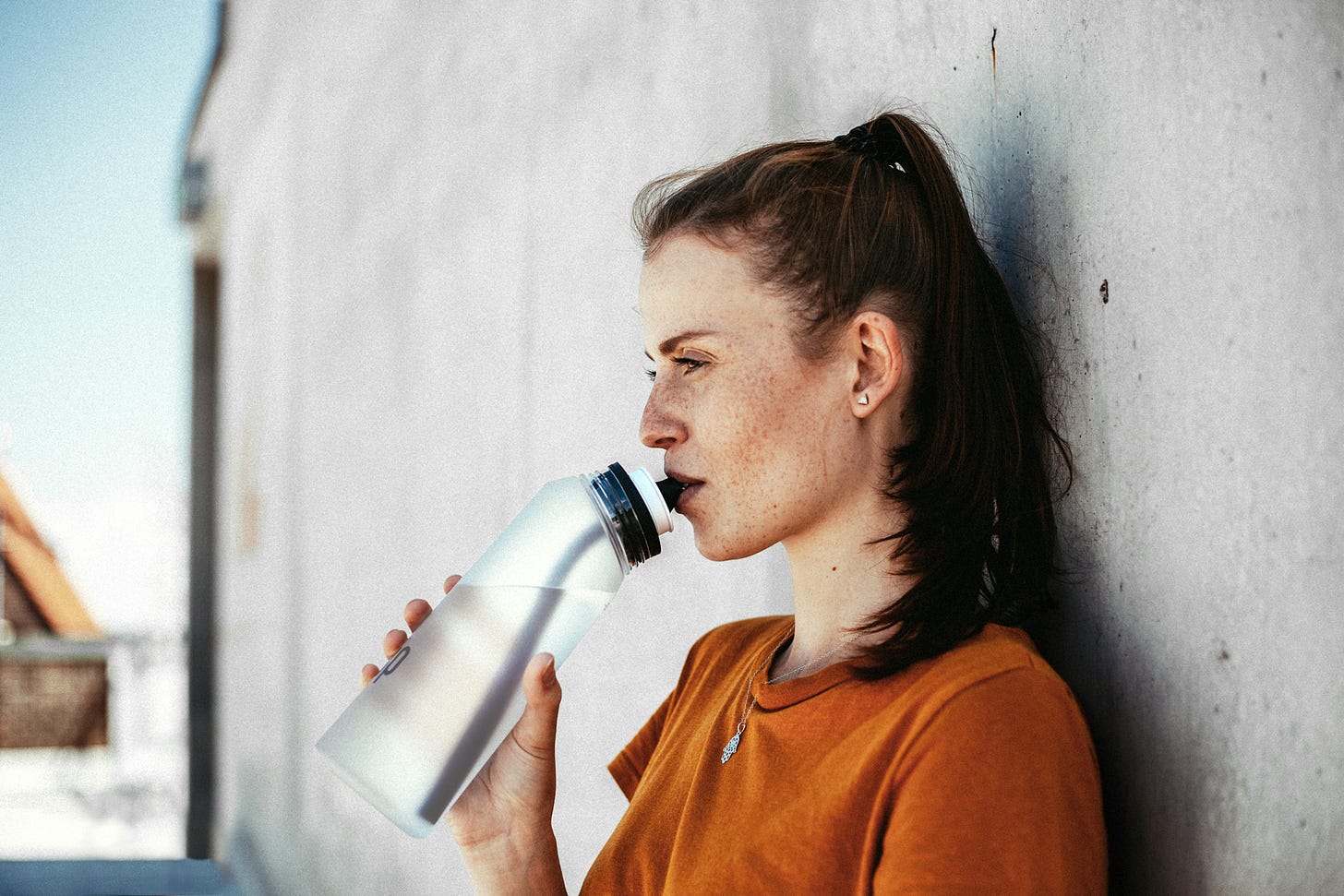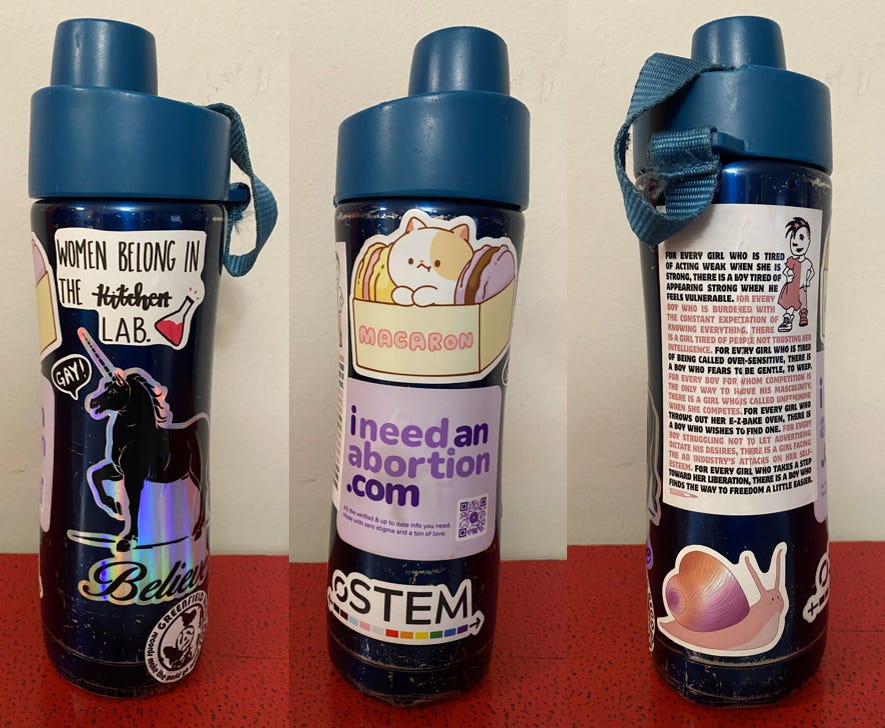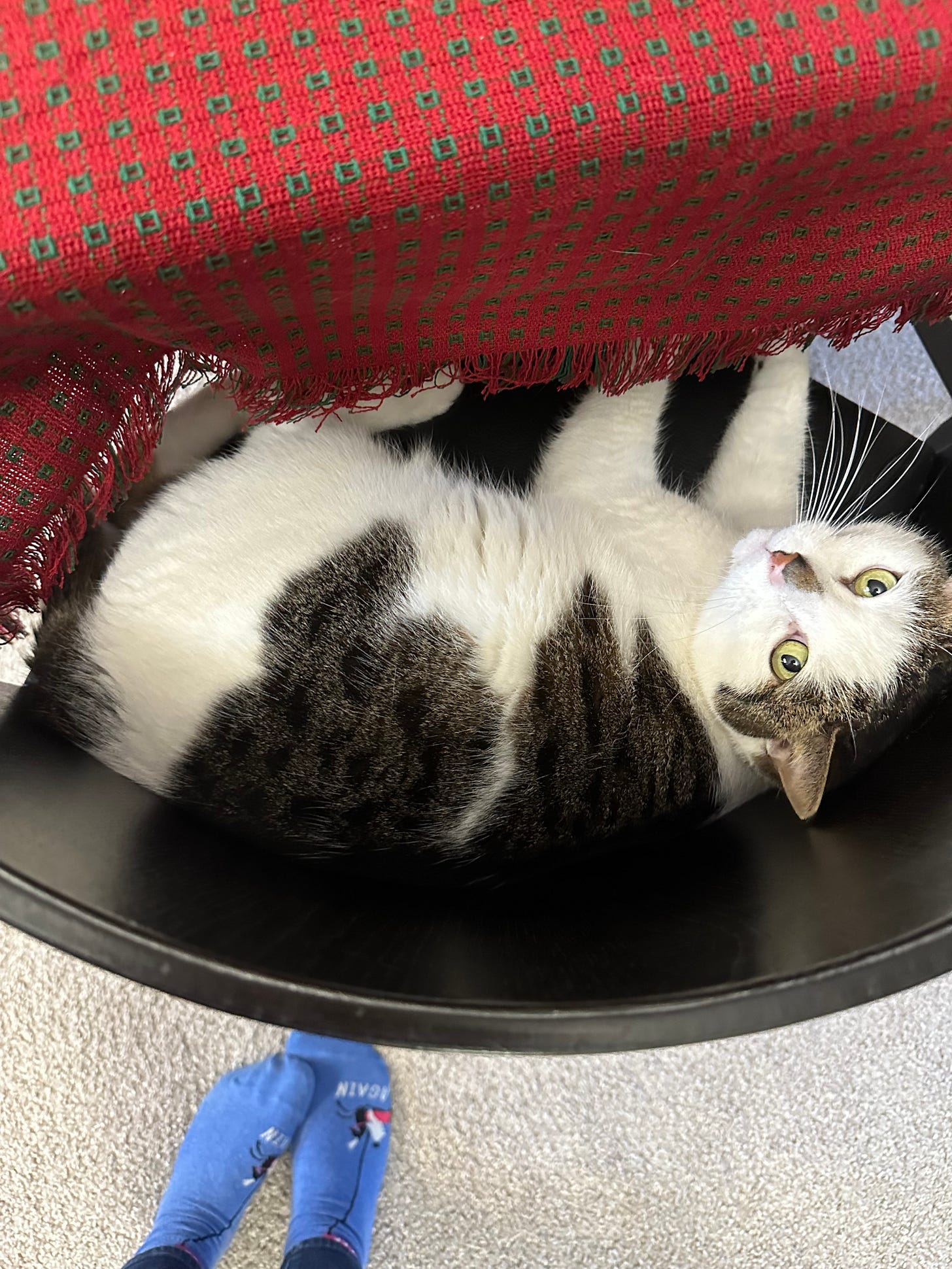I’m being bombarded with ads for a product that I can’t stand. While this brand promises a low-cost, sustainable solution to “transforming” your drinking experience, as a plastics expert I have some notes.

YouTubers and influencers left and right are accepting brand deals from Air Up, who sells a very special kind of water bottle. The premise of the product is that, instead of buying flavored water, you can turn regular water into “scented” tap water using plastic “scent pods” that provide the experience of flavor without actually adding anything into your water.
I would argue that throwing some cucumber slices or fresh fruit juice directly into your home tap water is vastly easier, allows for more variety, uses zero plastic, and doesn’t require a subscription service twice as expensive as Netflix…but what do I know??
I first heard about the Air Up bottle from a video by Internet Shaquille—the only respectable YouTuber—and I immediately thought, “ugh, what a waste of plastic!!” Maybe it’s the fact that I teach not one, but two, courses on plastic pollution, and another on green chemistry in general, so material waste is on my mind 24/7, no matter what semester we’re in. But upon learning that the scent pods only “work” with the slightly-angled Air Up bottle—you can’t just slap them on whatever bottle you have—and that 3 pods are only good for TEN DAYS, I thought that surely we’ve hit a new low as a society.
Before digging into this, I want to say that there are, indeed, some people who might really need this product. An entire module of my aforementioned plastics course is about eco-ableism, a symptom of which is neurodivergent/able-bodied people declaring that “surely THIS product doesn’t need to exist!!” and enacting bans without considering the needs of diverse people.
As I mentioned in my WaterTok video from a few months back, bariatric patients need help keeping water down, and the added “flavor” of the pods might be the motivation that some people need to drink more water. This is unequivocally a good thing, and it’s this exact balance that makes conversations around sustainability so difficult. If you truly need this product for whatever reason, I am not here to shame you whatsoever.
At the same time, as a general public we need to be more mindful of our consumer habits and how they may be affecting the planet. Air Up totes the sustainability of their product by claiming that their scent pods are 99% more transport efficient and use 88% less plastic compared to bottles of flavored water. Let’s assess those claims.
Buying one good-quality water bottle rather than drinking out of single-use plastic bottles every day is undeniably a win for the planet; more people should certainly be doing this! Better yet, Air Up’s plastic bottles are made of Tritan, a material which is free of toxic BPA and it’s toxic cousins like BPS. But don’t clap just yet: Tritan is marketed as being the safest plastic out there, and sometimes marketed specifically for its anti-estrogenic behavior (since BPA’s toxicity partially lies in it being an endocrine disruptor). However, doing a little digging past the first Google result—the card for “is Tritan safe?” disappointingly extols its virtues—shows that this isn’t true at all.
A study from 2014 (nearly ten years ago!!) demonstrated Tritan’s estrogenic activity, completely opposite to its producer Eastman’s claims about the material. In plain English, the material caused the growth of breast cancer cells to accelerate, an effect that ceased when an estrogen blocker was introduced. As was reported back then, the main culprit seems to be triphenyl phosphate (TPP), one of Tritan’s constituent ingredients, yet companies like Eastman continue to promote the plastic as being safe. Worse, newer studies have even demonstrated transient BPA in Tritan drinking bottles, so we’re back at square one here.
Fun fact: Tritan is the material used in the new Aeropress Clear, which I bought before learning about the material’s toxicity. Like a fool, I trusted the top Google result, swayed by my desire for the perfect home latte—swayed by my desire for New Stuff. Even I, the plastic expert, am not immune to propaganda!! There’s something to be said about Google’s monopoly on information, too, but I’ll leave that for a future newsletter topic.
This is not a great start for the Air Up bottle. But to be Fair and Balanced, Air Up not only offers a metal bottle for purchase, their claim about the pods being more “transport efficient” is entirely plausible. Liquids are heavy, gently-scented plastic is notably lightweight, and the pods are indeed smaller than even just one 500-mL bottle of fluid. “Transport efficient” is a bit of a techno-babble way to say that they’re “lighter”, almost as if to obfuscate the true nature of the product to a scientifically-uninformed audience, but fine, chalk up a point for Air Up.
As for that other claim, that the pods “use up to 88% less plastic than flavored drinks sold in single-use plastic bottles”, this is also true! 3 scent pods—made of polypropylene, plastic #5—are effective for the equivalent of ~30 500-mL bottles of flavored beverage. If each 500-mL bottle contains ~10 grams of plastic, that’s 300 grams of plastic. Each scent pod only weighs a few grams, so sure, that checks out…assuming that instead of using the scent pods, you’re drinking the same amount of flavored beverage entirely from single-use bottles.
…That baseline isn’t exactly fair. Yes, using a pod per day may be better than buying, drinking from, and throwing to landfill 3 PET bottles per day, every day. At the same time, that kind of consumption is also infinitely worse than simply not consuming a flavored/scented beverage every single day of your life. Again, these pods only last a few days!
Am I alone in thinking that this type of consumption is insane? Am I the weird one for drinking entirely unflavored water from the tap, with the occasional sparkling water from an aluminum can as a treat? Capitalism is actually having me second-guess whether dropping a cucumber in my water bottle is freak behavior. Again, I hope this doesn’t come off as cynical; real fruits and veggies can mold in your water bottle if you forget that they’re there, and for a certain kind of ADHD person, the scent pods might be useful. For many people, though, this kind of product may only lead to more plastic use, especially if you’re a plain water-enjoyer switching TO the Air Up system FROM a relatively plastic-free beverage experience.
This all gets worse when you consider the lack of recyclability. Let’s start with the fact that all plastic recycling is basically a lie; most plastics can only be recycled 2-3 times before their properties permanently degrade. For Air Up specifically, while the company claims that the polypropylene pods can be thrown “right in the bin”, in reality many recycling sites don’t collect polypropylene at all. Knowing what I know about recycling centers and how little they accept plastic with food waste on them, I doubt that they would welcome specially-scented polypropylene with who-knows-what-kinds of additives. In fact, polypropylene (resin identification code #5) is generally recycled at much lower rates than PET (code #1); polypropylene plastic is recycled at a 3% rate, while PET is recycled at a 30% rate. By this metric—assuming you recycle—you might even be more sustainable buying those 3 PET beverage bottles a day than by using Air Up pods!! (Although if you can, please avoid both!)
Fortunately, the Air Up community—if you can call it that—seems to be waking up to these disadvantages, including the obscene near-$30/month cost (!!!) of using the scent pods regularly. I don’t want to just breeze by that fact; if you use the system daily, as intended, this product will cost you more than some cell phone plans. Some users are even reporting weird-tasting water, suspiciously off-color pods, and poor customer service.
A bottle made of poisonous plastic, for which you need near-daily discs of oil-derived polypropylene, creates an otherworldly level of environmental danger. But don’t worry, their website says the system is “suitable for vegan and vegetarian diets”. Thank goodness that animals are being saved by the oil and gas industry…oh, wait. For a company to insist that the average, non-disabled person “needs” a product like this is delusional.
Many sustainability activists have, rightfully, placed blame on corporations for not producing enough truly sustainable products. Overall, this is a great shift in thinking; oil and gas companies have very successfully campaigned to get individual humans to calculate their “carbon footprint”, mainly to obfuscate the fact that climate change is mostly due to the actions of giant corporations, not the average human (although uber-wealthy individuals can be blamed as well).
Unfortunately, whenever companies get grilled about sustainability—especially when using oil-derived, never-biodegrading plastic—they get to respond with “Hey, people are buying it! We’re just responding to consumer behavior!!” And they’d be right; over a decade ago, Sun Chips introduced a 100% compostable chip bag, which was swiftly meme’d and dismissed when people complained that the bags were “too noisy”. And remember before when I said that PET’s properties degrade after just a few recycles? One of the artifacts of that recycling is a slight yellowing in the plastic, which in my opinion, doesn’t look that bad. But bottle manufacturers know that because the public has associated brownish/yellowish colors with poor quality/“dirtiness”, such bottles would never sell. So what they do to “fix” this “problem” is they add tons of extra, unnecessary additives to the recycled plastic to return it to its original color, additives which then leach out of the bottle into your drink, and then into your body.

Two things can be true at once: corporations need to move towards sustainable products, AND ALSO the general public has to demand sustainable products. Part of that latter piece is learning how to be okay with things looking, feeling, or sounding slightly “worse”. Until the public becomes okay with off-yellow food packaging, and learns that it doesn’t mean that the food is being dirtied by it (at least not for the reasons they think), we will never get food packaging made from recycled resins, or better yet, compostable bioplastics.
Infinite convenience all the time is, undeniably, killing the planet. But I have one more UNO Reverse Card up my sleeve…why is it that people have this expectation that everything should be hyper-convenient and “beautiful” all the time, with pollution rarely being a factor in our decision-making? Is it a “moral sickness” in society that needs to be stomped out with righteous rage and public shaming?
I have an alternative theory: human beings are not this way on accident due to some sort of “original sin” such as greed. This kind of thinking was done to us, gradually, over many generations by companies who want infinite growth at the expense of our future. Capitalism deskills us and keeps us from imagining futures outside of those which New Stuff can provide for us. Worse, it keeps us from imagining solutions that have existed for a long time; like metal or glass bottles, and dropping real fruit into them!! I myself have had the same exact metal water bottle for the past 13 years, which I proudly displayed in all its dented glory (until, of course, getting a bunch of cool, gay stickers this past summer)…
Keep on DIYing your flavor experience, readers! Drop some cucumber slices or squeeze some lemon juice into your water, and be sure to throw the waste into your trash (or compost!!) at the end of the day so it doesn’t get moldy. Air Up even sells a steel bottle is you absolutely must have this product, for your disability for example. Otherwise, as a plastics expert I hereby declare this product inessential.
I love sharing my plastic knowledge with the world, especially since there’s so much that everyday people aren’t aware of. How would y’all feel about me making “dunking on near-pointless plastic stuff” into a recurring series? Let me know in the comments! :)
Currently Reading
In disappointing plastics news, courts sided with 3M and DuPont’s “right” to keep polluting the planet and its life with toxic ingredients. Yet another reason why I call it the “criminal legal system” and not the “criminal justice system”; because there is no justice until all bodies are free!
Thinkpiece Tribe, a creator who just made an amazing video about Palestine, also assembled an awesome resource list, which includes Tirrrb’s Google Drive of free eBooks about liberation. It was so good that I put the link in my own website’s resource list, where it shall remain until Palestine is free: www.thatannamarie.com/resources
I was lucky enough to be featured in the Bookends 2024 Holiday Gift Guide! If you didn’t know, Bookends is a fantastic leftist feminist bookstore in Florence, MA. I was asked to contribute to their gift guide, for which I recommended “Becoming Abolitionists” by Derecka Purnell and “Data Feminism” by Catherine D'Ignazio and Lauren F. Klein. I even wrote some short reviews of these amazing books! If you’re in the Valley this winter, go check out Bookends! The store also has a GoFundMe right now, so throw them some coins that way too!

Watch History
Safiya Nygaard made a video about TikTok Shop that blew my mind (and went even harder than my own essay about the feature). Quality control in late stage capitalism has reached a new low, with dozens of listings for the same product that don’t even give you the product you purchase. Clown world!!
From the great Olurinatti, a video essay about why Americans don’t care about Palestine. Essential viewing!
Bops, Vibes, & Jams
Every now and again, I put out a playlist of what I’ve been listening to lately. Here is my latest, with 3 hours of my favorite songs from the past few months!
And now, your weekly Koko.
That’s all for now! See you next week with more sweet, sweet content.
In solidarity,
-Anna






‘Capitalism deskills us’ is the phrase I needed to land in my brain today. Thank you 🙏